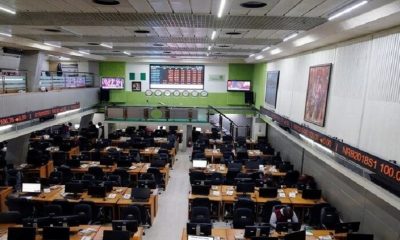Economy
Pension Funds Missing Out On Equity Market Performance

By Quantitative Financial Analytics
Nigerian pension funds continue to show resilience and strength so far in 2017 as they gather improvements in performance but it seems that no matter how hard they try, they are lagging the performance of pure equity portfolios.
All the major indexes in Nigeria are recording mouth-watering performances in the upper double digits except NSE Insurance and NSE Oil and Gas Index whose performance is of single digits.
While NSE Banking index has generated a YTD return of 64.07%, NSE Pension index is showing its strength at 58.48% YTD return.
Not to be out done, the NSE Premium index is standing tall with a YTD return of 51.64%, the NSE Stock Index 30 is also doing the same with a return of 45.44%.
The NSE Industrial, Lotus Islamic and NSE Consumer indexes are proud of themselves with YTD returns of 42.27%, 30.66% and 37.36% respectively but the All-Share Index is beating them with its YTD return of 41.78%.
The fundamentals of the economy are so strong as reflected by the Nigerian equity market that the S&P Nigerian Sovereign index is doing better than the S&P African Sovereign Index. It may take the efforts of financial historians to remember the last time the market did so good.
Even among individual equities that trade on the floor of the exchange, a great majority have rewarded their holders with fantastic returns.
May and Baker has recorded a 261% return YTD, Stanbic IBTC Holdings, 168.24%, Fidson Healthcare Plc, 146.54% to mention but a few although there still are a few like MRS Oil, Forte Oil Plc and 7-Up Bottling Co that are still making negative returns.
For those saving for their retirement through various pension schemes, there is the temptation to find out how good their pensions are doing in the light of the performance of the equity market.
To such investors, my take on that question is that the pension funds are doing good but not so good comparatively.
Among the pension funds in the RSA category, only 6 can boast of double digit YTD returns with APT RSA fund taking the lead with 15.37% followed by AIICO pension RSA fund with 10.02%, according to analysis by Quantitative Financial Analytics.
The good news however is that all the RSA funds are showing positive YTD returns of some sort.
The story is the same among the Retiree fund category in which APT Pension fund leads the YTD return ranking with 14.94% followed by Crusader Pension Retiree fund with 12.81%. Like the RSA funds, all the Retiree funds show positive YTD returns.
There is no doubt that the Nigerian pension fund industry has been very resilient through thick and thin.
When the market headed south in Q2 2016, pension funds held their own and put some smiles of the faces of retirement minded investors and savers.
However, pension funds seem to be missing out on the current equity market performance mostly because of the asset classes pension funds are allowed by regulation to allocate their capital to.
In keeping with such regulatory requirements, Nigerian pension funds have only about 7.45% of their assets in the domestic equity market, according to analysis of latest data from Pencom.
With such little exposure to the equity market, it is difficult not to be hurt when the equity market performs good like it is doing now.
Another reason why pension funds are missing out on the largesse of the stock market is the low correlation between the stock market (All-Share Index) and pension funds.
Per analysis conducted by Quantitative Financial Analytics, many of the pension funds have low correlation to the market.
Correlation is a ratio that measures the degree to which asset types like stocks, bonds, pension funds or mutual funds move up and down at the same time.
When two asset types are highly correlated, they tend to move up or down together but when they have low correlation between them, then they do not gyrate up or down together as much as when they are highly correlated.
In another analysis, Quantitative Financial Analytics measured the relationship between the stock market and pension funds by calculating the beta of the pensions in relation to the All-Share index. The analysis reveals that Nigerian pension funds have very low beta with respect to the equity market. The result of these analysis is not surprising given that the asset allocation strategies of the pensions is over weight in bonds and other fixed securities.
The implication of this is that the pension funds do not move in tandem with the market. It is agreed that pension funds need to be pursue conservative investment strategies to reduce the risk of loss of investors’ capital, it may be reasonable to increase exposure to the equity market in such a way that returns can be maximized while controlling risk.
Pension fund investors should however take solace in the fact that what they are missing in high performance they are gaining in low risk.
A risk analysis conducted by Quantitative Financial Analytics using the standard deviation of returns for pension funds and equities shows that the pension funds are much less risky than equities.
While the seemingly riskiest pension fund has a standard deviation of 1.37, the corresponding number for equities is 31.58, according to the analysis.
Investment performance analysis experts are united in the opinion that risk adjusted returns are more meaningful than absolute returns. So pension fund investors can go to sleep in comfort knowing that what they lost in capital appreciation they gain in capital preservation.
Economy
Why Transparency Matters in Your Choice of a Financial Broker

Choosing a Forex broker is essentially picking a partner to hold the wallet. In 2026, the market is flooded with flashy ads promising massive leverage and “zero fees,” but most of that is just noise. Real transparency is becoming a rare commodity. It isn’t just a corporate buzzword; it’s the only way a trader can be sure they aren’t playing against a stacked deck. If a broker’s operations are a black box, the trader is flying blind, which is a guaranteed way to blow an account.
The Scam of “Zero Commissions”
The first place transparency falls apart is in the pricing. Many brokers scream about “zero commissions” to get people through the door, but they aren’t running a charity. If they aren’t charging a flat fee, they are almost certainly hiding their profit in bloated spreads or “slippage.” A trader might hit buy at one price and get filled at a significantly worse one without any explanation. This acts as a silent tax on every trade. A transparent broker doesn’t hide the bill; they provide a live, auditable breakdown of costs so the trader can actually calculate their edge.
The Conflict of Market Making
It is vital to know who is on the other side of the screen. Many brokers act as “Market Makers,” which is a polite way of saying they win when the trader loses. This creates a massive conflict of interest. There is little incentive for a broker to provide fast execution if a client’s profit hurts their own bottom line. A broker with nothing to hide is open about using an ECN or STP model, simply passing orders to the big banks and taking a small, visible fee. If a broker refuses to disclose their execution model, they are likely betting against their own clients.
Regulation as a Safety Net
Transparency is worthless without an actual watchdog. A broker that values its reputation leads with its licenses from heavy-hitters like the FCA or ASIC. They don’t bury their regulatory status in the fine print or hide behind “offshore” jurisdictions with zero oversight. More importantly, they provide proof that client funds are kept in segregated accounts. This ensures that if the broker goes bust, the money doesn’t go to their creditors—it stays with the trader. Without this level of openness, capital is essentially unprotected.
The Withdrawal Litmus Test
The ultimate test of a broker’s transparency is how they handle the exit. There are countless horror stories of traders growing an account only to find that “technical errors” or vague “bonus terms” prevent them from withdrawing their money. A legitimate broker has clear, public rules for getting funds out and doesn’t hide behind a wall of unreturned emails. If a platform makes it difficult to see the exit strategy, it’s a sign that the front door should have stayed closed.
Conclusion
In 2026, honesty is the most valuable feature a broker can offer. It is the foundation that allows a trader to focus on the charts instead of worrying if their stops are being hunted. Finding a partner with clear pricing, honest execution, and real regulation is the first trade that has to be won. Flashy marketing is easy to find, but transparency is what actually keeps a trader in the game for the long haul.
Economy
Nigeria’s Stock Market Indices Shrink 0.41% Amid Panic Sell-Offs

By Dipo Olowookere
The Nigerian Exchange (NGX) Limited came under panic sell-offs on Thursday, as the investing community awaits the outcome of a probe into trading activities around one of the stocks on the bourse.
On Monday, trading in Zichis equities was prohibited by the regulator after it gained almost 900 per cent in one month of being listed by introduction on the growth board of the exchange.
This action triggered cautious trading on Customs Street, and things have not remained the same since then.
Yesterday, the key performance indices of the Nigerian bourse further depreciated by 0.41 per cent, the third straight loss this week, as investors book profit before being trapped.
It was observed that the energy industry gained 0.12 per cent and was the only one in green, as the industrial goods space shed 1.19 per cent, the banking counter depreciated by 0.63 per cent, the insurance sector lost 0.32 per cent, and the consumer goods segment tumbled by 0.03 per cent.
As a result, the All-Share Index (ASI) contracted by 802.39 points to 193,567.81 points from 194,370.20 points, and the market capitalisation decreased by N515 billion to N124.239 trillion from N124.754 trillion.
During the session, investors traded 868.5 million shares worth N31.5 billion in 69,310 deals compared with the 1.4 billion shares valued at N46.2 billion exchanged in 70,222 deals at midweek, showing a drop in the trading volume, value, and number of deals by 37.96 per cent, 31.82 per cent, and 1.30 per cent, respectively.
Jaiz Bank led the activity chart with 78.9 million equities valued at N1.2 billion, Japaul traded 73.3 million stocks worth N274.8 million, Access Holdings exchanged 66.9 million shares for N1.7 billion, Chams sold 56.9 million equities worth N239.6 million, and Zenith Bank transacted 45.5 million stocks valued at N4.1 billion.
The worst-performing stock for the day was Jaiz Bank after it lost 9.98 per cent to trade at N12.63, Ikeja Hotel declined by 9.90 per cent to N37.75, John Holt shrank by 9.90 per cent to N8.65, Enamelware slipped by 9.88 per cent to N36.50, and Cadbury went down by 9.69 per cent to N61.95.
On the flip side, FTN Cocoa was the best-performing stock after it gained 10.00 per cent to sell for N6.05, RT Briscoe improved by 9.95 per cent to N11.38, Deap Capital soared 9.92 per cent to N6.98, Japaul grew by 9.91 per cent to N3.77, and Ellah Lakes surged 9.72 per cent to N11.85.
Investor sentiment remained bearish as the exchange finished with 30 price gainers and 38 price losers, implying a negative market breadth index.
Economy
Champion Breweries Concludes Bullet Brand Portfolio Acquisition

By Aduragbemi Omiyale
The acquisition of the Bullet brand portfolio from Sun Mark has been completed by Champion Breweries Plc, a statement from the company confirms.
This marks a transformative milestone in the organisation’s strategic expansion into a diversified, pan-African beverage platform.
With this development, Champion Breweries now owns the Bullet brand assets, trademarks, formulations, and commercial rights globally through an asset carve-out structure.
The assets are held in a newly incorporated entity in the Netherlands, in which Champion Breweries holds a majority interest, while Vinar N.V., the majority shareholder of Sun Mark, retains a minority stake.
Bullet products are currently distributed in 14 African markets, positioning Champion Breweries to scale beyond Nigeria in the high-growth ready-to-drink (RTD) alcoholic and energy drink segments.
This expansion significantly broadens the brewer’s addressable market and strengthens its revenue base with an established, profitable portfolio that already enjoys strong brand recognition and consumer loyalty across multiple markets.
“The successful completion of our public equity raises, together with the formal close of the Bullet acquisition, marks a defining moment for Champion Breweries.
“The support we received from both existing shareholders and new investors reflects strong confidence in our long-term strategy to build a diversified, high-growth beverage platform with pan-African scale.
“Our focus now is on disciplined execution, integration, and delivering sustained value across markets,” the chairman of Champion Breweries, Mr Imo-Abasi Jacob, stated.
Through this transaction, Champion Breweries is expected to achieve enhanced foreign exchange earnings, expanded distribution leverage across African markets, integrated supply chain efficiencies, portfolio diversification into high‑growth consumer beverage categories, and strengthened presence in the RTD and energy drink segments.
The acquisition accelerates Champion Breweries’ transition from a regional brewing business to a multi-category consumer platform with continental reach.
Bullet Black is Nigeria’s leading ready-to-drink alcoholic beverage, while Bullet Blue has built a strong presence in the energy drink category across several African markets.
-

 Feature/OPED6 years ago
Feature/OPED6 years agoDavos was Different this year
-
Travel/Tourism10 years ago
Lagos Seals Western Lodge Hotel In Ikorodu
-

 Showbiz3 years ago
Showbiz3 years agoEstranged Lover Releases Videos of Empress Njamah Bathing
-

 Banking8 years ago
Banking8 years agoSort Codes of GTBank Branches in Nigeria
-

 Economy3 years ago
Economy3 years agoSubsidy Removal: CNG at N130 Per Litre Cheaper Than Petrol—IPMAN
-

 Banking3 years ago
Banking3 years agoSort Codes of UBA Branches in Nigeria
-

 Banking3 years ago
Banking3 years agoFirst Bank Announces Planned Downtime
-

 Sports3 years ago
Sports3 years agoHighest Paid Nigerian Footballer – How Much Do Nigerian Footballers Earn





















